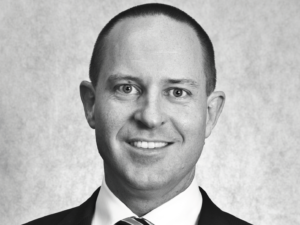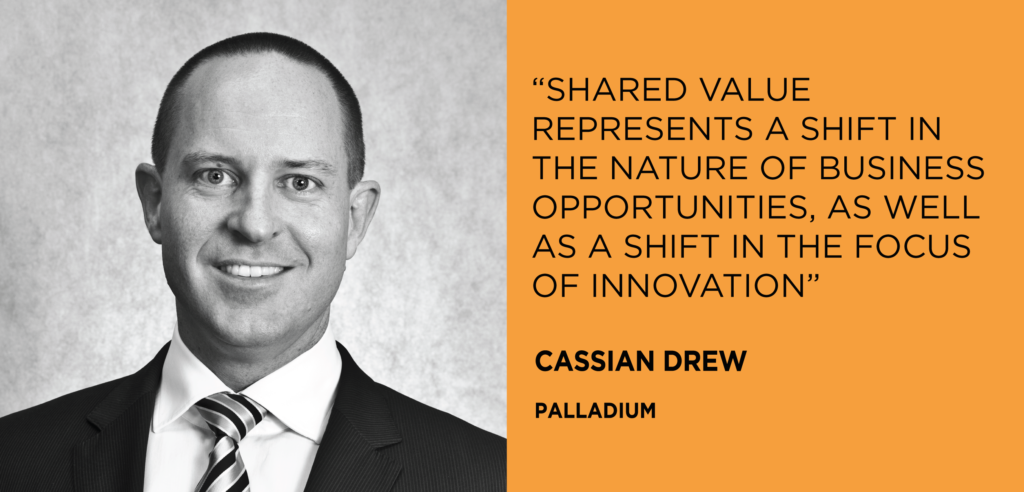 In this month’s member interview series we feature Casssian Drew, Asia Pacific Regional Director, Positive Impact Partnerships at Palladium. Cassian shares his experience with shared value and the role he plays at Palladium in leading the development of the firm’s approach to solving complex societal issues through multi-stakeholder coalitions through ‘Positive Impact Partnerships’, a model drawing on shared value and collective impact frameworks to create a new form of investment and large-scale societal change delivery structure.
In this month’s member interview series we feature Casssian Drew, Asia Pacific Regional Director, Positive Impact Partnerships at Palladium. Cassian shares his experience with shared value and the role he plays at Palladium in leading the development of the firm’s approach to solving complex societal issues through multi-stakeholder coalitions through ‘Positive Impact Partnerships’, a model drawing on shared value and collective impact frameworks to create a new form of investment and large-scale societal change delivery structure.
What does shared value mean to you?
To me, shared value represents distinct mobilisation of private sector talent and capital that is aiming to address societal issues through new business models. Beyond this, it also represents a measurable shift in the psyche of the private sector as the ‘softer’ social and environmental agenda of corporations is viewed through a core-business lens: It represents a shift in the nature of business opportunities, as well as a shift in the focus of innovation.
I believe that, in some sense, shared value has also presented private sector talent with a language and purpose that can be used to encapsulate a lot of interesting and trending concepts that are particularly engaging for millennials; including disruption, social impact, and social enterprise. To me, through the work we are doing at Palladium, it has also drawn in the opportunity to link business strategy with broader discussions around partnerships for change, blended finance and offset instruments such as impact bonds.
What are some lessons we as businesses can learn from shared value?
Porter and Kramer’s catalysing Harvard Business Review article presented a clear framework through which executives could consider how their business might create a positive impact on society. However, many executives I’ve spoken with will quickly claim that their organisation has been practising shared value well before the term was popularised.
In fact, even in the international development world where shared value has gained significant traction, the technical activities of creating shared value have been a core part of the international development toolkit for decades; termed market development. And, even today some development agencies will use shared value and market development concurrently and distinctively.
A lesson for business is that corporations around the world have aspired to shared value principals for a long time. However, right now, the coincidental business environment conditions of changing political economy, new consumer demand, millennial talent aspiration, and increased need for social licence to operate are together the catalyst for a renewed focus on achieving shared value aspirations. I think businesses should see that the timing is right to invest further in societal purpose. I also see that businesses taking an early position in this space are being rewarded. Regardless of the scale of impact, the early adopters have had significant global coverage of their activities.
What lead you individually to the shared value idea? How did you come across it?
Over the last twenty years, I’ve spent fifteen years working internationally and recently counted twenty-three countries where I have engaged in projects. I took up an interest in driving societal outcomes when, in the early 2000’s, I worked as an interim commercial director for the UK’s impact investment fund, the National Endowment for Science Technology and the Arts (NESTA) where I worked across the portfolio to drive creation of sustainable social enterprise.
After this I joined HM Government’s Office of the Deputy Prime Minister followed by a career as a strategy consultant with Booz & Company where I focused on public sector reform. This took me from London to the Middle East where we were advising on institutional reformation across the Gulf and North Africa. I was involved in the creation of many new public agencies including contributing to the Economic and Environmental Vision for the world’s richest state and to the establishment of a space agency! I was offered a role to setup and take on a leadership role in a new economic development agency for the Abu Dhabi Government – a unique and privileged opportunity that I enjoyed for four years.
One of the many lessons I learned from Abu Dhabi (literal translation as Father of Deer) was that the approach to human and economic development seamlessly integrated the roles of Government, state owned enterprise and the private sector to deliver economic, social and environmental outcomes for Abu Dhabi’s people. It is difficult for those not familiar with Abu Dhabi to conceive what happened in the Emirate over the 2005-2015 period; but relative to the baseline the economic and human development results are spectacular. While the culture of business was truly commercial, the leaders of the Emirate, and of Abu Dhabi’s corporations, are passionately committed to Abu Dhabi’s broader society and I think this has played a critical factor in how businesses behave – and the impacts are clear.
When I joined Palladium I was quickly exposed to the formal ‘shared value’ construct. Our focus on building large-scale partnerships between business and society, and driving socio-economic development programs frequently draws on the shared value approach and language.
What does shared value success look like at Palladium and where are you at on the journey?
Palladium focuses on delivery of Positive Impact. This is something we define as the intentional creation of societal and economic value. I would propose, hopefully humbly, that we are well down the road in the shared value journey. Palladium is deeply aligned with the shared value agenda, a partner in the Shared Value Project as well as the Shared Value Initiative.
Market development and involvement of the private sector is a key instrument for change in international development; and we have deep expertise in this. Given we operate in over 100 countries we’ve learned a lot on how to build effective multi-actor partnerships, and learned a lot on how to effectively enable and structure societal impact through the private sector.
We’re proud to be a lead international development partner of DFAT and are excited to be DFAT’s delivery partner for the Business Partnerships Platform (BPP) which has been getting a lot of positive attention as one of the Department’s flagship programs. This in particular has been a genuine privilege for the firm – to share our client’s own shared value journey.
Which shared value projects have you enjoyed working on the most?
One of my favourite programs that we have delivered for DFAT is PRIMSA in Indonesia, a Markets for the Poor (M4P) program that showcases how market mechanisms can be used to drive a reduction in poverty at scale. PRISMA supports the goal of contributing to a 30% or more increase in net incomes for 300,000 poor rural male and female farmers in Indonesia through market access and participation.
Our involvement in the Peru Cocoa Alliance represents another leading example of shared value that I think is a hidden gem in the shared value universe. This program has transformed society across three regions of Peru, positively impacting the livelihoods of over 22,000 families. The resulting economic model has sustained beyond the initial USAid donor and private sector investment which is an achievement not as common as most might think. Subsequently we have been advising other global cocoa programs on how to improve development, in particular those in Côte d’Ivoire.
In Australia we are working on a number of really interesting projects, in particular one Commonwealth funded NSW Government program aimed at devising shared value partnership model that will create new sources of value for a large commercial agricultural operator, impact investors, two divided aboriginal communities, and an important environmental wetland habitat that is about a third of the size of the ACT. It’s a fantastic project and one we are really passionate about.
What is your role individually within Palladium to support the company along its shared value journey?
I’ve been with Palladium for two years now, and we’ve been through a lot of progressive change over this period as we realise our strategy to be a global leader in the development and delivery of positive impact solutions. I lead the development of new integrated service offerings across our Asia Pacific markets and have a fantastic team working across Australia, Indonesia and Papua New Guinea.
Our strengths are in large-scale complex and systemic market reforms to achieve socio-economic development outcomes. Much of my individual role has been about building on these strengths and identifying new approaches to engaging the private sector in large-scale development programs. We offer the private sector Social Change as a Service; acknowledging that in most cases it is not the core activity of a bank or insurance company to reform education systems, health care service delivery, and broadly enhance the societal conditions in which they and their suppliers operate.
We deliver social change through a new type of investment and delivery vehicle called Positive Impact Partnerships (PIPs) which represent a distinct shift beyond traditional Public Private Partnerships to deliver systemic societal change. PIPs addresses the limitations of traditional public private partnerships as a mechanism for co-investment and allocation of risk in programs that aim to drive national-scale systemic change and resolve complex societal issues.
What do you think are some pertinent issues in Australia that could be solved through creating shared value?
We have been proactive in driving shared value projects across six thematic areas: Water, Environment and Food Security; Regions, Growth and Prosperity; Cities and Resilience; Migration, Youth and Education; Ageing, Longevity and Wellbeing; and Economic Empowerment and Inclusion.
We’ve recently launched the Australian STEM Partnership which has presented a new approach to driving STEM educational outcomes in a partnership between industry, Australia’s education systems, and Australia’s STEM talent.
Indonesia Mampu Diabetes Prevention, is a partnership we have launched to create systemic change at the scale of Indonesia’s 250 million population. Under the Office of the Vice President of Indonesia the partnership is creating key enablers to drive prevention of the disease in partnership with key industry players and Health Authorities.
Partnerships for Forests (P4F) is a fantastic program running in Indonesia and driving investment models that incentivise prevention of deforestation agriculture. We also have an exciting PIP about to launch in Papua New Guinea focused on broad socio-economic development of the country and are now working with partners to launch several others in agricultural value chain reform and electrification of rural communities in South East Asia.
